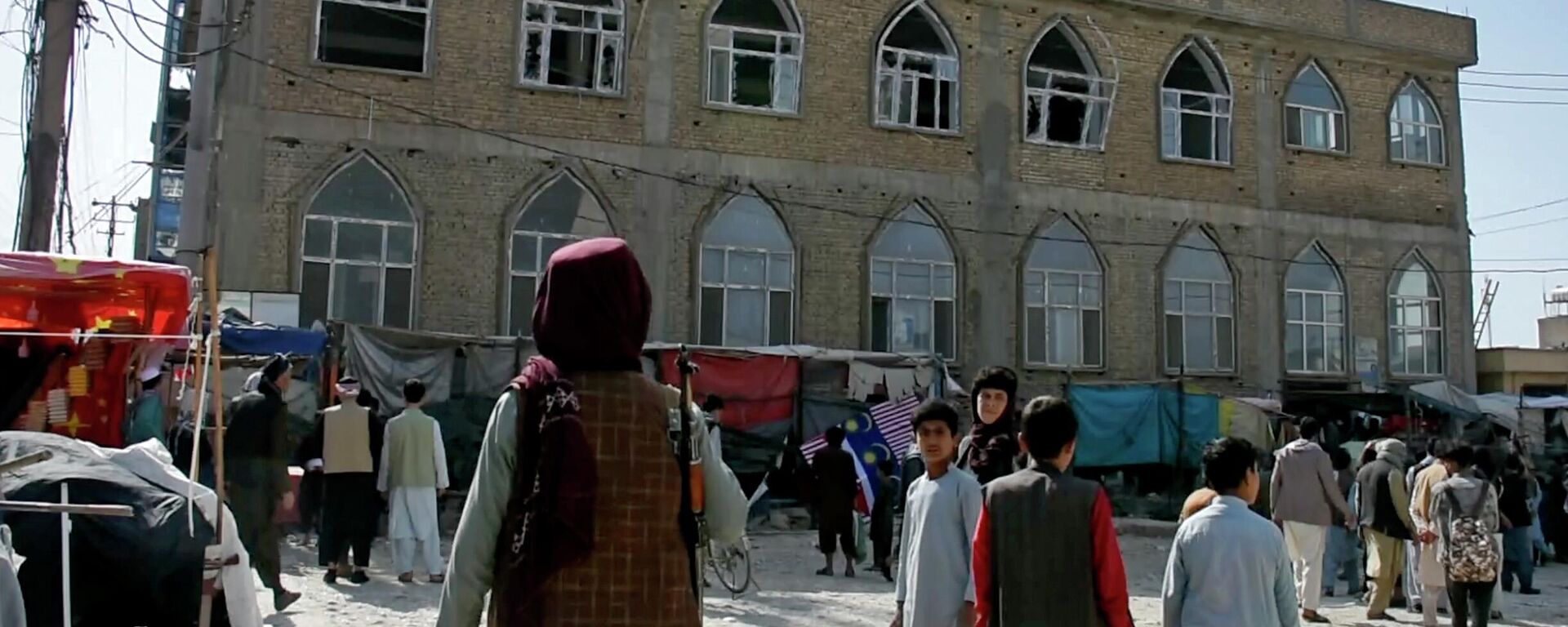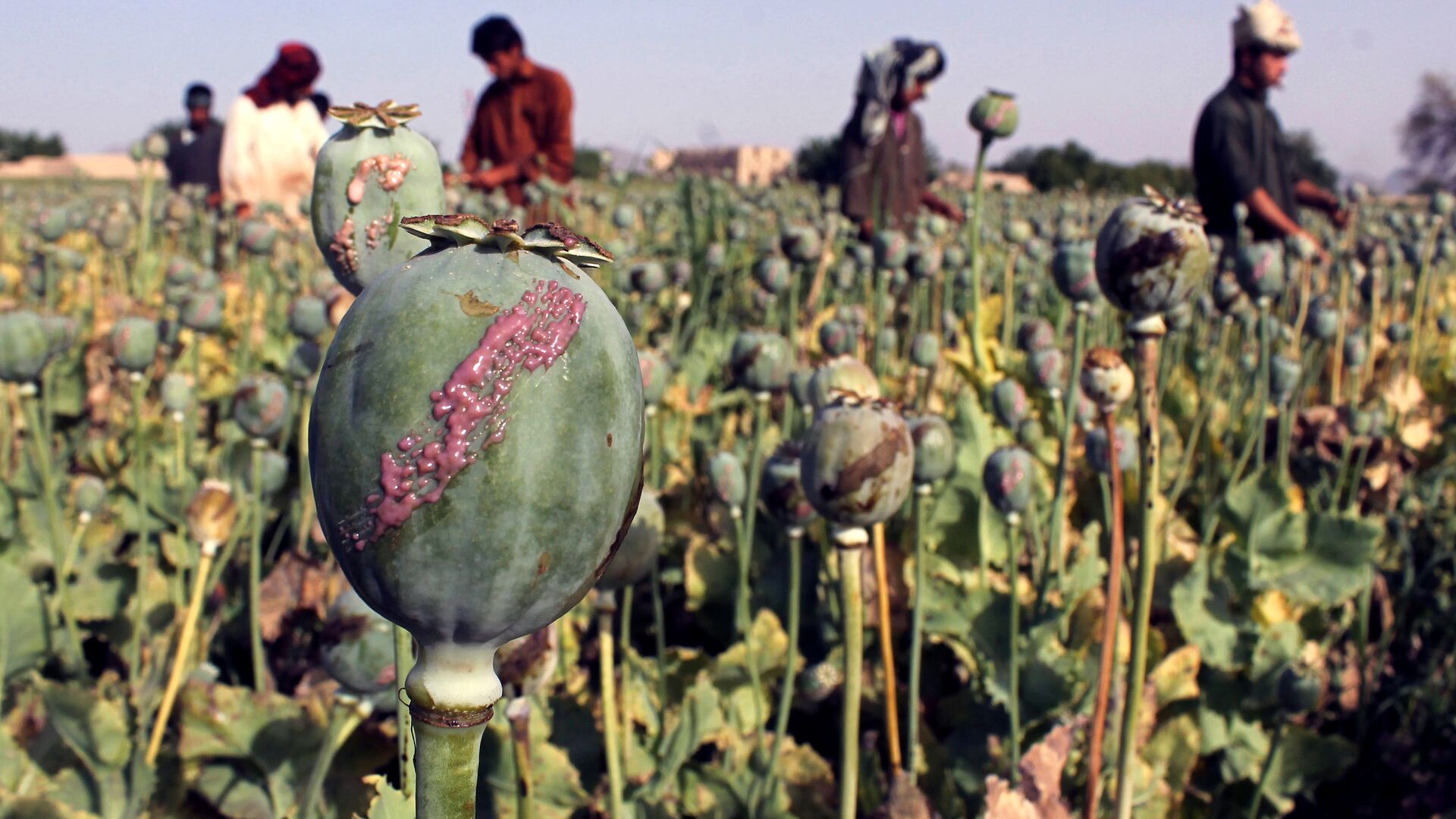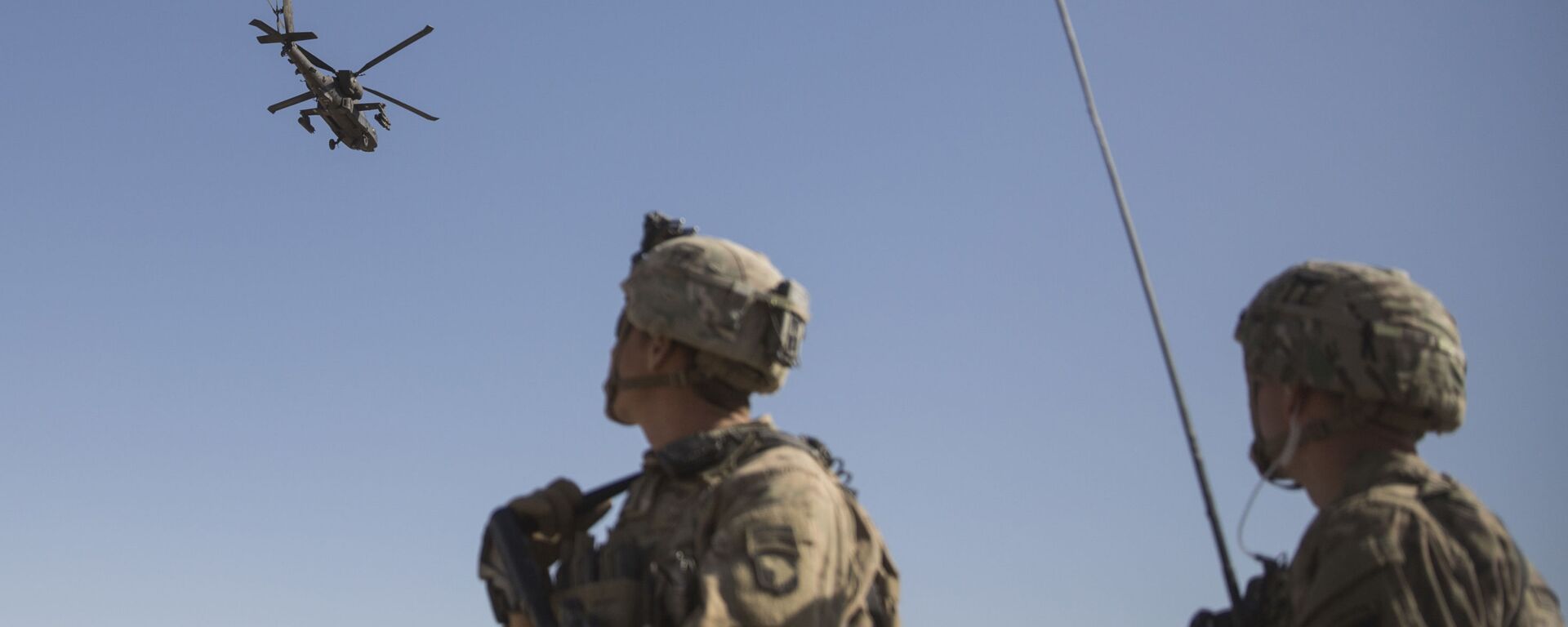https://sputnikglobe.com/20230610/the-talibans-ban-works-opium-production-collapses-in-afghanistan-1111020122.html
The Taliban’s Ban Works: Opium Production Collapses in Afghanistan
The Taliban’s Ban Works: Opium Production Collapses in Afghanistan
Sputnik International
Poppy cultivation, the plant that is used to make opium, is down 99% in Afghanistan following a ban from the Taliban
2023-06-10T03:18+0000
2023-06-10T03:18+0000
2023-06-10T03:18+0000
world
mullah haibatullah
afghanistan
helmand
badakhshan
taliban
the united nations (un)
opium
opium poppy
poppy
https://cdn1.img.sputnikglobe.com/img/103181/96/1031819679_0:185:3834:2342_1920x0_80_0_0_545d3dfc85783e5530d8b31a32001977.jpg
Poppy cultivation in Afghanistan has decreased dramatically after a ban on poppy production was instituted in April 2022, new findings by the research group Alcis have revealed.The production of poppy, the plant opium is harvested from and which serves as a precursor to other opiates like heroin, saw a steep decline in the Helmand province, previously the largest producer in Afghanistan from more than 120,000 hectares (nearly 300,000 acres) in 2022 to less than 1,000 hectares in 2023. Nationwide, Alcis, which cited high-resolution satellite imagery and other research, says poppy production has fallen by 99%.The reduction in Helmand alone far exceeds any attempt to curb opium production by the former Afghan Republic or occupying US forces, even when considering the entire country. The majority of the land previously dedicated to poppy production is now focused on growing wheat.Opium prices have increased accordingly. By November 2022, opium in Afghanistan increased to $360 per kilogram in the south and southwest of the country and $475 per kilogram in the eastern part of the country. That is a 500% to 691% increase from its $60 price in 2020 before the Taliban returned to power.That increase is similar to the price increase following the 2000/01 ban, which saw opium prices increase from $30 in 2000 to a record high of $700 in 2001. By 2008, it had decreased to $92.Taliban leader Mullah Haibatullah imposed a ban on drugs in April 2022, an announcement that was met with much skepticism by the West and media outlets. Those skeptics received a significant boost when the United Nations Office on Drugs and Crime (UNODC) issued its annual Afghanistan Poppy Production Report that year, stating that production had increased 32%.2021 was a down year for poppy production in Afghanistan, seemingly due to weather, but the roughly 10% drop from 2020 could only partially explain the 2022 increase. This led many to doubt that Haibatullah was serious about enforcing the ban.That skepticism was increased when the Taliban released videos showing tractors destroying small, newly planted poppy fields, while chest-high nearly harvestable poppies remained untouched in the background.But the UNODC report and skeptics did not take into account the cultivation cycle of poppy production. The crops harvested in the first half of 2022 were planted 12 months before the UNODC report and five months before the drug ban.The Taliban ultimately decided against destroying those crops as it would have left farmers, who had invested significant effort and money into cultivating them, destitute without it, which may have caused mass unrest in the country.Instead, they focused on the second and third plantings of that year, which tend to have much smaller harvests and would affect the bottom line of farmers far less. But the action largely served as a sign to farmers that the Taliban would destroy more crops the next season.The Taliban also used the early stages of the ban to focus on the destruction of a growing methamphetamine market, with great success. There was also the issue of getting other factions of the government on board and rural farmers. Afghanistan is a very rural country and whatever government controls it, including the Taliban, has limited reach in many areas.That effort may have only been partially accomplished by Haibatullah, because opium production has continued and even increased in some areas, like Badakhshan, reflecting what happened after the 2000/01 ban. Then, as now, the increase in Badakhshan is not nearly enough to make up the difference.Despite the dramatic decrease in production, Alcis says it does not seem that Europe and other countries are experiencing an opiate shortage, judging by the amount seized by Afghanistan’s neighbors. This suggests poppy farmers have significant stockpiles, and since the Taliban has not yet banned the trade of already harvested poppy, it's likely some farmers are making a significant windfall from the increased prices.During the 2000/01 ban, it took 18 months for the UK to see a significant decrease in heroin purity. Some have speculated that the ban would result in an increase in synthetic opiates, like fentanyl, however, that has not manifested. The report adds that if the Taliban extends the ban another season, or if they ban the sale of harvested poppy, an opiate shortage may occur.The ban may also have a negative economic effect on the Afghan population. While large landowners, who were able to save their stockpiles until prices rose and likely saw a benefit because of that, the farm helpers, who are hired to weed and harvest the crop and are typically paid with part of the harvest, likely would have to sell it immediately. Many poor Afghans make a third or more of their income sharecropping on opium farms.Smaller farms, particularly in the northern provinces are also likely to suffer since it is unlikely they may grow enough wheat to feed their families, or enough cash crops like cotton and melons, to make up for the lost income.Exacerbating the issue is undoubtedly the economic crisis that has hit the country, brought on at least in part by UN sanctions and the US freezing of $7 billion of Afghanistan’s assets, though half of that has been put into a fund by the US and Swiss governments to be selectively doled out.Alcis notes this may lead to an increase in Afghan migration, which remains relatively cheap. It costs roughly $2,000 to be ferried by land to Turkey, and for a little more they can get further, including Europe. “Indeed, were a protracted ban in place, European nations might face a choice between Afghan drugs or Afghan migrants,” the study concludes.*The Taliban is under UN sanctions for terrorism* Terrorists affiliated with Daesh (ISIS/ISIL), outlawed in Russia and many other countries.
https://sputnikglobe.com/20230505/us-created-toxic-cancerous-new-police--security-forces-in-afghanistan---former-envoy-1110131532.html
https://sputnikglobe.com/20230120/russian-presidents-envoy-for-afghanistan-says-there-is-evidence-us-secretly-sponsoring-daesh-1106520915.html
afghanistan
helmand
badakhshan
Sputnik International
feedback@sputniknews.com
+74956456601
MIA „Rossiya Segodnya“
2023
News
en_EN
Sputnik International
feedback@sputniknews.com
+74956456601
MIA „Rossiya Segodnya“
Sputnik International
feedback@sputniknews.com
+74956456601
MIA „Rossiya Segodnya“
opium production, afghanistan, poppy, consequences of the afghan war, us occupation of afghanistan, drug war
opium production, afghanistan, poppy, consequences of the afghan war, us occupation of afghanistan, drug war
The Taliban’s Ban Works: Opium Production Collapses in Afghanistan
Opium production fell dramatically in Afghanistan under Taliban* rule in 2001 after a ban was instituted in 2000. After the US-led invasion of the country at the end of 2001, poppy production returned to its historic levels and the country remained the world’s largest supplier of opium until this year.
Poppy cultivation in Afghanistan has decreased dramatically after a ban on poppy production was instituted in April 2022,
new findings by the research group Alcis have revealed.
The production of poppy, the plant opium is harvested from and which serves as a precursor to other opiates like heroin, saw a steep decline in the Helmand province, previously the largest producer in Afghanistan from more than 120,000 hectares (nearly 300,000 acres) in 2022 to less than 1,000 hectares in 2023.
Nationwide, Alcis, which cited high-resolution satellite imagery and other research, says poppy production has fallen by 99%.
The reduction in Helmand alone far exceeds any attempt to curb opium production by the former Afghan Republic or occupying US forces, even when considering the entire country. The majority of the land previously dedicated to poppy production is now focused on growing wheat.
Opium prices have increased accordingly. By November 2022, opium in Afghanistan increased to $360 per kilogram in the south and southwest of the country and $475 per kilogram in the eastern part of the country. That is a 500% to 691% increase from its $60 price in 2020 before the Taliban returned to power.
That increase is similar to the price increase following the 2000/01 ban, which saw opium prices increase from $30 in 2000 to a record high of $700 in 2001. By 2008, it had decreased to $92.
Taliban leader Mullah Haibatullah imposed a ban on drugs in April 2022, an announcement that was met with much skepticism by the West and media outlets. Those skeptics received a significant boost when the United Nations Office on Drugs and Crime (UNODC) issued its
annual Afghanistan Poppy Production Report that year, stating that production had increased 32%.
2021 was a down year for poppy production in Afghanistan, seemingly due to weather, but the roughly 10% drop from 2020 could only partially explain the 2022 increase. This led many to doubt that Haibatullah was serious about enforcing the ban.
That skepticism was increased when the Taliban released videos showing tractors destroying small, newly planted poppy fields, while chest-high nearly harvestable poppies remained untouched in the background.
But the UNODC report and skeptics did not take into account the cultivation cycle of poppy production. The crops harvested in the first half of 2022 were planted 12 months before the UNODC report and five months before the drug ban.
The Taliban ultimately decided against destroying those crops as it would have left farmers, who had invested significant effort and money into cultivating them, destitute without it, which may have caused mass unrest in the country.
Instead, they focused on the second and third plantings of that year, which tend to have much smaller harvests and would affect the bottom line of farmers far less. But the action largely served as a sign to farmers that the Taliban would destroy more crops the next season.
The Taliban also used the early stages of the ban to focus on the destruction of a growing methamphetamine market, with great success. There was also the issue of getting other factions of the government on board and rural farmers. Afghanistan is a very rural country and whatever government controls it, including the Taliban, has limited reach in many areas.
That effort may have only been partially accomplished by Haibatullah, because opium production has continued and even increased in some areas, like Badakhshan, reflecting what happened after the 2000/01 ban. Then, as now, the increase in Badakhshan is not nearly enough to make up the difference.

20 January 2023, 09:32 GMT
Despite the dramatic decrease in production, Alcis says it does not seem that Europe and other countries are experiencing an opiate shortage, judging by the amount seized by Afghanistan’s neighbors. This suggests poppy farmers have significant stockpiles, and since the Taliban has not yet banned the trade of already harvested poppy, it's likely some farmers are making a significant windfall from the increased prices.
During the 2000/01 ban, it took 18 months for the UK to see a significant decrease in heroin purity. Some have speculated that the ban would result in an increase in synthetic opiates, like fentanyl, however, that has not manifested.
"It is difficult to determine whether the same kind of time lag would apply this time round," the report states. "After all, the 2000/01 ban was imposed for only one season and collapsed in the wake of 9/11."
The report adds that if the Taliban extends the ban another season, or if they ban the sale of harvested poppy, an opiate shortage may occur.
The ban may also have a negative economic effect on the Afghan population. While large landowners, who were able to save their stockpiles until prices rose and likely saw a benefit because of that, the farm helpers, who are hired to weed and harvest the crop and are typically paid with part of the harvest, likely would have to sell it immediately. Many poor Afghans make a third or more of their income sharecropping on opium farms.
Smaller farms, particularly in the northern provinces are also likely to suffer since it is unlikely they may grow enough wheat to feed their families, or enough cash crops like cotton and melons, to make up for the lost income.
Exacerbating the issue is undoubtedly the economic crisis that has hit the country, brought on at least in part by UN sanctions and the US freezing of $7 billion of Afghanistan’s assets, though half of that has been put into a fund by the US and Swiss governments to be selectively doled out.
Alcis notes this may lead to an increase in Afghan migration, which remains relatively cheap. It costs roughly $2,000 to be ferried by land to Turkey, and for a little more they can get further, including Europe. “Indeed, were a protracted ban in place, European nations might face a choice between Afghan drugs or Afghan migrants,” the study concludes.
*The Taliban is under UN sanctions for terrorism
* Terrorists affiliated with Daesh (ISIS/ISIL), outlawed in Russia and many other countries.




